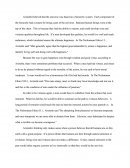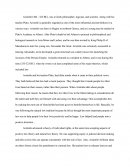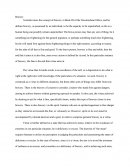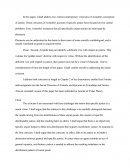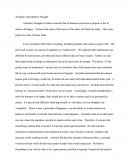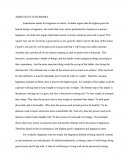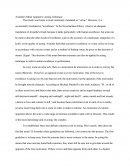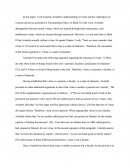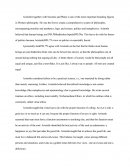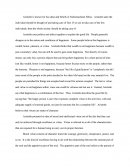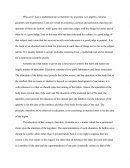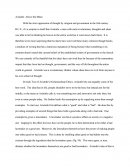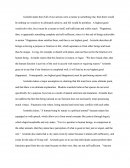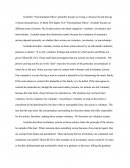Philosophy Essays
-
Aristotle and Virtue
Aristotle believes that we need virtue, both of thought and of character, to achieve that completeness leading to happiness. This is the function: activity in the soul in accord with virtue, where soul is defined as what is in us that carries out our characteristic activity. Aristotle is right in
Rating:Essay Length: 513 Words / 3 Pages -
Aristotle Book 3
Book 3: Aristotle "Politics" Ð'* Aristotle suggests that a citizen is anyone who is entitled to share in deliberative or judicial office (which is limited to individuals in democracies) Ð'* Citizenship is often reserved for this born to citizen parents, but this can be untrue in times of revolution or
Rating:Essay Length: 585 Words / 3 Pages -
Aristotle Case
Aristotle introduces the idea that virtue is in and of itself a happiness that can only be reached by attaining the excellence of a human being. He also believes that goodness is how well something serves its purpose, that we do not have our capacities because of our human characteristics
Rating:Essay Length: 636 Words / 3 Pages -
Aristotle Ethics
Ekta Yadav Phil.322 2/19/07 Aristotle Ethics Aristotle's Nicomachean Ethics provides a sensible account for what true moral virtue is and how one may go about attaining it. Aristotle covers many topics that help reach this conclusion. One of them being the idea of mean between the extremes. Although Aristotle provided
Rating:Essay Length: 1,877 Words / 8 Pages -
Aristotle Ethics
Aristotle believed that the universe was based on a hierarchy system. Each component of the hierarchy had a reason for being a part of the universe. Rational human beings were at the top of the chain. This is because they had the ability to reason, and could develop wise and
Rating:Essay Length: 363 Words / 2 Pages -
Aristotle Impact on Law
Aristotle (384 - 322 BC), was a Greek philosopher, logician, and scientist. Along with his teacher Plato, Aristotle is generally regarded as one of the most influential ancient thinkers in a various ways. Aristotle was born in Stagira in northern Greece, and as a young man he studied in Plato's
Rating:Essay Length: 761 Words / 4 Pages -
Aristotle on Bravery and Friendship
Bravery Aristotle raises the concept of bravery in Book III of the Nicomachean Ethics, and he defines bravery, as possessed by an individual, to be the capacity to be unperturbed, as far as a human being can possibly remain unperturbed. The brave person may fear any sort of thing, be
Rating:Essay Length: 1,730 Words / 7 Pages -
Aristotle on Justice
In this paper, I shall address two central contemporary criticisms of Aristotle's conception of justice. These criticisms of Aristotle's account of specific justice have focused on two central problems. First, Aristotle's insistence that all specifically unjust actions are motivated by pleonexia Pleonexia can be understood as the desire to have
Rating:Essay Length: 2,111 Words / 9 Pages -
Aristotle Refutes Plato's Theory of Ideas on Three Basic Grounds
Aristotle refutes Plato's Theory of Ideas on three basic grounds: that the existence of Ideas contradicts itself by denying the possibility of negations; that his illustrations of Ideas are merely empty metaphors; and that they theory uses impermanent abstractions to create examples of perception. Though the theory is meant to
Rating:Essay Length: 1,332 Words / 6 Pages -
Aristotle Refutes Plato's Theory of Ideas on Three Basic Grounds
Aristotle refutes Plato's Theory of Ideas on three basic grounds: that the existence of Ideas contradicts itself by denying the possibility of negations; that his illustrations of Ideas are merely empty metaphors; and that they theory uses impermanent abstractions to create examples of perception. Though the theory is meant to
Rating:Essay Length: 1,332 Words / 6 Pages -
Aristotle Says That the State Is Natural. What Does He Mean?
"Human beings have an impulse to live with others rather than in isolation" . Aristotle argued that the development of the polis was natural and similar to the development and growth of biological organisms. Sophists on the other hand, considered that men were simply in pursuit of their own pleasure
Rating:Essay Length: 1,222 Words / 5 Pages -
Aristotle Virtue Ethics
Aristotle's Virtue Ethics The philosophy of virtue ethics, which primarily deals with the ways in which a person should live, has puzzled philosophers from the beginning of time. There are many contrasting interpretations regarding how one should live his or her life in the best way possible. It is in
Rating:Essay Length: 793 Words / 4 Pages -
Aristotle Vs. Plato Learning Is Recollection
What alternative does Aristotle offer to Plato's claim that learning is recollection? Where would Aristotle locate the mistake in Plato's argument in The Phaedo? In his dialogues The Phaedo and Meno, Plato, through the form of Socrates, puts forth the idea that all learning is recollection. In The Phaedo, to
Rating:Essay Length: 677 Words / 3 Pages -
Aristotle's and Modern Thought
Aristotle's and Modern Thought Aristotle's thoughts of ethics conclude that all humans must have a purpose in life in order to be happy. I believe that some of the basics of his ideas still hold true today. This essay points out some of those ideas. It was Aristotle's belief that
Rating:Essay Length: 605 Words / 3 Pages -
Aristotle's Critique of Plato
Aristotle's Critique of Plato Aristotle took a distinct path verging from the foundation of Plato's philosophy. In order to control society Plato used the noble lie, so people under the state wouldn't question their place in life. Aristotle, on the other hand, used the idea of "civic virtue of friendship"
Rating:Essay Length: 477 Words / 2 Pages -
Aristotle's Ethical Theory and How It Conflicts, If at All, with Our Contemporary Worldview
Aristotle's ethical theory and how it conflicts, if at all, with our contemporary worldview. Aristotle is one of the most well known philosophers in history. He was born in 384 BC in Stagira, which is in Macedonia. His father was personal physician to the king of Macedonia at that time,
Rating:Essay Length: 766 Words / 4 Pages -
Aristotle's Eudaimonia
ARISTOTLE'S EUDAIMONIA Eudaimonia stands for happiness in Greek. Aristotle argues that the highest good for human beings is happiness. He insists that every action performed by humans is to pursue happiness. Aristotle also argues that human action is always aimed at some end or good. This "good" may not be
Rating:Essay Length: 1,039 Words / 5 Pages -
Aristotle's Happiness and Virtue
In Aristotle’s piece entitled “Happiness and Virtue,” he discusses the different types of virtues and generally how one can achieve happiness. According to Aristotle, human happiness is a life long process. It is continuously ongoing and the purpose has the end in itself. Happiness is an activity of the soul
Rating:Essay Length: 442 Words / 2 Pages -
Aristotle's Mean Applied to Acting Technique
Aristotle's Mean Applied to Acting Technique The Greek word arete is most commonly translated as "virtue." However, it is occasionally translated as "excellence." In the Nicomachean Ethics, virtue is an adequate translation of Aristotle's Greek because it deals particularly with human excellence, but arete can be used to describe other
Rating:Essay Length: 1,140 Words / 5 Pages -
Aristotle's Moral Theory
In this paper, I will examine Aristotle's understanding of virtue and his explanation of virtuous actions as presented in Nicomachean Ethics. In Book II of the work, Aristotle distinguishes between moral virtues, which are learned through habit and practice, and intellectual virtues, which are learned through instruction. However, it is
Rating:Essay Length: 1,759 Words / 8 Pages -
Aristotle's Nicomachean Ethics
Aristotle In Nicomachean Ethics Aristotle makes the case for the fulfillment of Eudimonea, the greatest happiness and good that a person can achieve. He states that there are 3 ways in which creatures, human specifically go about trying to fulfill Eudimonea. The first is through pleasure, be it sensual, tactile
Rating:Essay Length: 428 Words / 2 Pages -
Aristotle's Ordinary Versus Kant's Revisionist Definition of Virtue as Habit
Aristotle's Ordinary versus Kant's Revisionist Definition of Virtue as Habit L. Hughes Cox Centenary College of Louisiana lcox@beta.centenary.edu ABSTRACT: In what follows I examine the following question: does it make a difference in moral psychology whether one adopts Aristotle's ordinary or Kant's revisionist definition of virtue as habit? Points of
Rating:Essay Length: 3,823 Words / 16 Pages -
Aristotle's Theory of Human Nature
Aristotle (together with Socrates and Plato) is one of the most important founding figures in Western philosophy. He was the first to create a comprehensive system of philosophy, encompassing morality and aesthetics, logic and science, politics and metaphysics. Aristotle believed that human beings are “featherless bipeds”. This has to do
Rating:Essay Length: 374 Words / 2 Pages -
Aristotle's View on Friendship
When it comes to friendship, most everyone has something to say. No matter where you look, the theme of friendship is always present, whether it be through quotes, such as one written by Saint Jerome that states, "The friendship that can cease has never been real" or through songs, such
Rating:Essay Length: 1,361 Words / 6 Pages -
Aristotle's View on the Polis
Aristotle is known for his ideas and beliefs in Nichomachean Ethics. Aristotle sates the individual should be thought of and taking care of first. If we are to take care of the few individuals, then the whole society should be taking care of. Aristotle uses politics and ethics together to
Rating:Essay Length: 1,196 Words / 5 Pages -
Aristotle's Views on Education
Who am I? I am a mathematician so therefore my expertise is in algebra, calculus, geometry and trigonometry. I am not versed in economics, politics and astronomy therefore my opinions of these are foolish. And I quote now each man judges well the things he knows and of these he
Rating:Essay Length: 538 Words / 3 Pages -
Aristotle: Above the Mean
Aristotle: Above the Mean With the strict oppression of thought by religion and government in the 2nd century B.C.E., it's a surprise in itself that Aristotle, a man with such revolutionary thoughts and ideas was able to let his thinking be known to the entire world (as it was known
Rating:Essay Length: 1,246 Words / 5 Pages -
Aristotle: Living Well
The word polis, stemming from ancient Greek city-states, is defined as a city, a city-state, citizenship, or as a body of citizens. According to Aristotle, the definition of city-state would serve as the most correct, as the word polis was often used to name them. The city as Aristotle knew
Rating:Essay Length: 1,713 Words / 7 Pages -
Aristotole: Happiness
Aristotle states that if all of our actions were a means to something else, then there would be nothing we would try to ultimately achieve, and life would be pointless. A highest good would solve this, but it must be a means to itself, self-sufficient and within reach. "Happiness, then,
Rating:Essay Length: 497 Words / 2 Pages -
Aritotle's Voluntary and Involuntary Actions
Aristotle's "Nicomachean Ethics" generally focuses on living a virtuous life and having virtuous characteristics. In Book III Chapter II of "Nicomachean Ethics", Aristotle focuses on different types of actions. He divides actions into three categories: voluntary, involuntary and nonvoluntary. Aristotle makes this distinction mainly because his evaluation of someone's actions
Rating:Essay Length: 686 Words / 3 Pages




